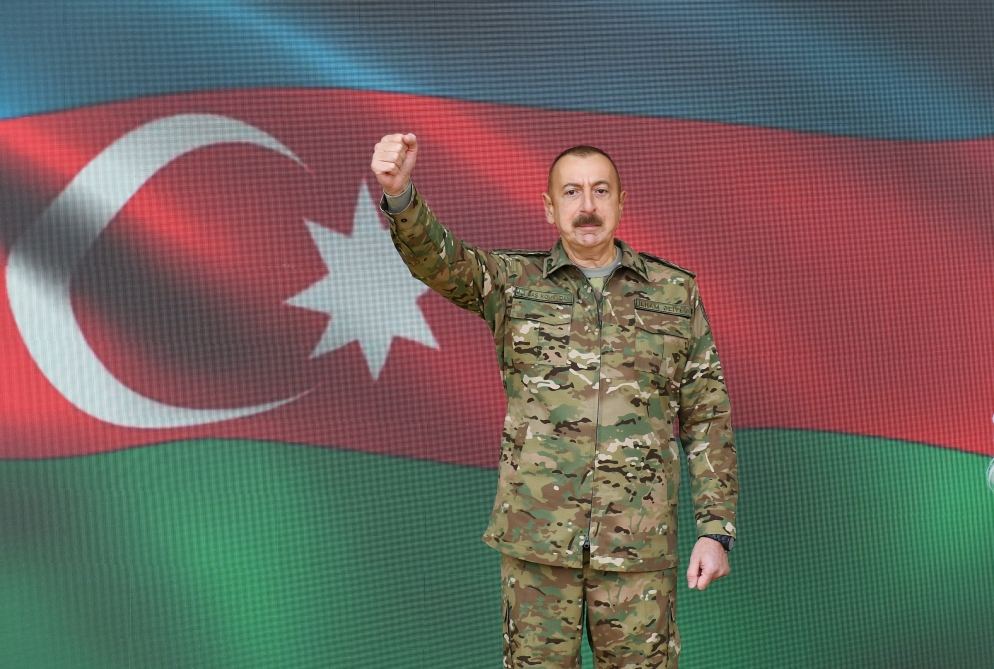BAKU, Azerbaijan, November 10. It has been four years since Armenia, suffering heavy losses due to the counter-offensive of the Azerbaijani army, was compelled to sign an act of surrender on November 10.
This date holds significant importance for Azerbaijan, marking the victory in the 44-day Patriotic War. While the streets of Baku were filled with joy and celebrations, Armenia faced a contrasting reaction with public outrage, leading to a storming of the parliament building.
Though the statement was trilateral, it was signed live by President of Azerbaijan, Supreme Commander-in-Chief Ilham Aliyev, and Russian President Vladimir Putin. However, the location where Armenia's Prime Minister Nikol Pashinyan signed the document remains unknown, fueling frustration among Armenians who couldn't locate him on that day.
In his address to the nation on November 10, President of the Republic of Azerbaijan Ilham Aliyev remarked on the event:
"Everyone must respect themselves, even in the most challenging and critical situations. Respect themselves and their country. Pashinyan will sign it one way or another. We have forced him to do that. But he will sign it in a confined place, in a locked-up room, far from the cameras, in a cowardly and treacherous manner. He is not signing it of his own free will. He is signing it under pressure by the iron fist!"
Regardless of the circumstances surrounding its signing, the night of November 10 became a moment of shame for Armenia, as it formally acknowledged its defeat. Up until that point, Armenian officials had made empty statements about victory but soon realized they had no choice but to admit their helplessness.
The chaos on the streets of Yerevan was a direct result of misleading actions by Armenian authorities, who falsely assured the public of "successful attacks." In reality, their military faced devastating losses. That night, Ararat Mirzoyan, now Armenia's Foreign Minister, became a target of an angry mob and was beaten in Yerevan.
Armenia's act of surrender was a political continuation of Azerbaijan's decisive victory on the battlefield, led by President Ilham Aliyev. The November 10 declaration, signed by President Aliyev, dictated Azerbaijan's terms to Armenia, leading to the peaceful handover of strategic regions like Kalbajar, Lachin, and Aghdam without a single shot fired.
This political triumph by the Azerbaijani President struck a severe blow to Armenian separatism and terrorism, leaving an indelible mark on Armenia's history. The aggressive actions of Armenia towards Azerbaijan were met with a resolute response, and historical justice was restored as Azerbaijan dismantled many of Armenia's self-created myths.
Armenians saw their narratives of an "invincible army" and "immortal spirit" shattered. By signing the act of surrender, Armenia admitted its inability to counter the new realities established by Azerbaijan in the region.
Throughout the war, President repeatedly stated that the fighting would cease if Armenia provided a withdrawal date. Armenia's leadership, however, refused, leading to catastrophic consequences for its army. As President noted, Azerbaijan compelled Armenia to sign the act of surrender.
The valor of Azerbaijani soldiers in battles across Jabrayil, Fuzuli, Zangilan, Gubadli, and Shusha left the Armenian leadership with no option but to face reality. The Azerbaijani army restored justice and permanently rid its lands of enemies, eradicating Armenian separatism in Karabakh and Eastern Zangazur, securing peace and stability.
The firm political will of President Ilham Aliyev forced the opponent to surrender, accept defeat, and officially document their helplessness.
The unity of the Azerbaijani people under the leadership of President Aliyev and the formidable "iron fist" ensured the eternal freedom of Eastern Zangazur and Karabakh.
This victory is a significant milestone in Azerbaijan's glorious history, remembered as a moment when the fight for justice concluded in triumph, and the enemy's shame was revealed to the world.







